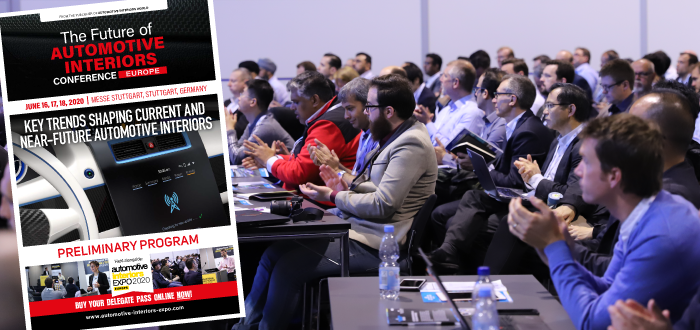The world’s leading international event for automotive interiors has revealed its preliminary program for the 2020 conference. The Future of Automotive Interiors Conference is dedicated to the study of future interior design, innovative seating, lighting, ergonomics, instrumentation, control systems, new HMI approaches, in-car entertainment and connectivity, and onboard wellness and safety challenges, as well as the opportunities and challenges offered by increased vehicle autonomy and ever more sophisticated consumers. The Future of Automotive Interiors Conference 2020 will be held June 16-18, at Hall 4, Messe Stuttgart, Germany, and will once again provide an exceptional opportunity to see industry leaders share their innovations, knowledge and insights through a comprehensive and diverse range of conferences and panel discussions. Highlights include:

Richard Chung, executive product manager at Toyota Boshoku, Japan, will discuss autonomous interiors for autonomous vehicles. Currently, all the attention on autonomous vehicles is focused on self-driving; but what about the interior? Toyota Boshoku feels that the interior functions and features need to work autonomously for the occupants’ comfort and convenience and a superb mobility experience. The MX191 concept for the year 2025 addresses this goal holistically, through its uniquely developed six concierge systems that take care of the occupants in the interior space.

The changing world is demanding sustainability solutions for automotive interiors. Listen to Dr George Kellie, director, Kellie Solutions Ltd/EDANA, UK, consider the rapid growth and drive for new-generation materials offering genuinely sustainable solutions. The automotive industry is clearly faced with this challenge, at the same time as dramatic changes are taking place in powertrains, and with very demanding emissions legislation. There are some exciting solutions available that can meet many of these challenges simultaneously. Dr Kellie will focus on developments in plastics and non-woven materials.

Hyundai Motor Group’s senior engineer of HMI, Regina Kaiser, will describe the importance of active haptic feedback and the future of touch interaction. Touch-sensitive surfaces in automotive interiors have been around for a while and there is no longer anything extraordinary about them. However, adding active haptic feedback as an additional cue to touch-based interactions opens up new possibilities for the design of user interfaces. Therefore, interfaces that were long seen as high risk can now be realized and are even on the edge of becoming an automotive reality. One example of this is Hyundai’s touch steering wheel development. With active haptic feedback, an enriched user experience can be created directly at the tip of a finger.

João Manuel Carvalho Gomes, chief operations officer, CeNTI, Portugal, will present seamless textile sensing solutions for car seats. A considerable number of car accidents can be attributed to driver drowsiness. Several studies have concluded that drowsiness while driving contributes to traffic-related morbidity and mortality, and therefore it is considered a public health issue. An effective strategy to prevent drowsiness-related car accidents is to monitor drivers’ drowsing state and alert them. The development of a robust, cost-effective, seamless sensing solution for automobile seats will be presented. This innovative solution combines heartrate and respiratory monitoring through bio-radars with comfort monitoring (humidity, temperature and pressure sensing) to gain a more accurate perception of the driver’s state.

Probabilistic driver models for advanced driver assistance systems will be examined by Mark Eilers, principal scientist, Humatects. Advanced driver assistance systems require models for the monitoring, understanding, assessment and anticipation of human drivers. This talk will present a modeling suite for the development of probabilistic driver models and their utilization in a variety of use cases including driver intention recognition, traffic prediction and autonomous control. Humatects realize driver models as dynamic Bayesian networks that capture temporal evolutions and statistical relationships between driver’s state and behavior, vehicle and environment. Inputs are selected objectively from a variety of features proposed by psychological literature. The structure and parameters of the models are estimated offline from data or online using Bayesian machine learning approaches.

Efrat Friedland, founder of Materialscout, will explain how to design for emotional experiences. We have all seen futuristic interior designs of mobility products. But we have no way of knowing if these designs will indeed be the final product we’ll see. What we do know is who will be using these products. Understanding the future users and consumers will help us bring values to the forefront of our products and brands, to create more meaningful and enjoyable experiences. This lecture will help you understand how to use materials and technologies to create an emotional bond with your product.
The conference (rates apply) takes place June 16-18, alongside the free-to-attend Automotive Interiors Expo 2020 Europe, which will showcase the latest interior materials, technologies, concepts, comforts, innovations and suppliers. Book your pass for the Future of Automotive Interiors Conference 2020, the world’s only international conference exclusively dedicated to automotive interiors, here.



